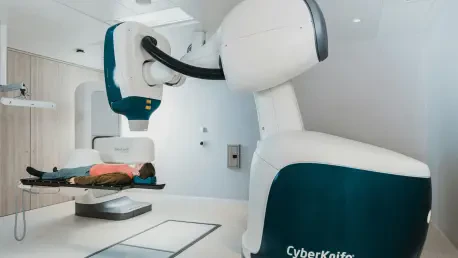The medical industry constantly seeks advancements that improve patient care and diagnostic accuracy while reducing costs and risks. Belgian medtech startup Nuclivision has secured €5M in funding aimed at revolutionizing medical imaging through the integration of artificial intelligence and enhanced software platforms. Nuclivision’s AI-driven software platform, Nuclarity, is designed to optimize positron emission tomography (PET) scans, which play a crucial role in visualizing physiological processes associated with various diseases.
The Vision Behind Nuclarity
Enhancing Efficiency and Safety
Nuclivision’s Nuclarity software is designed to make PET imaging more efficient while significantly reducing reliance on expensive and potentially harmful radiotracers. These radiotracers, although essential for PET scans, contribute to both financial and health-related challenges due to their cost and the radiation exposure involved. By optimizing the application of these radiopharmaceuticals, Nuclarity is poised to decrease the environmental impact and radiation dosage patients receive during the scanning process.
Broad Medical Implications
Beyond efficiency improvements, the technology holds potential for a wide range of medical applications. PET scans are indispensable in monitoring cellular activities, making them particularly valuable in the fields of oncology, neurology, and theranostics. By refining the accuracy and safety of these scans, Nuclarity could facilitate the early detection and treatment of conditions like cancer and Alzheimer’s disease, ultimately boosting the overall effectiveness of medical diagnostics.
Industry and Developmental Milestones
Founders and Strategic Partnerships
Founded in 2022 by Maarten Larmuseau, Tomas Brants, and Simon DeKeyser, Nuclivision is positioned to revolutionize nuclear medicine. The company is currently in the concluding stages of securing regulatory approval. Moving ahead, Nuclivision plans to expand across Europe and subsequently enter the U.S. market, signaling its readiness to introduce this transformative technology on a global scale. Such expansion is bolstered by strategic investments from LUMO Labs, Heran Partners, and the imec.istart future fund, which will not only provide funding but also lend critical expertise and resources.
Addressing Regulatory Challenges
Securing regulatory approval remains a critical step for Nuclivision’s growth and operational deployment. This phase plays a pivotal role as it ensures the technology meets stringent safety and efficacy standards before reaching a wider patient demographic. Sven Bakkes from LUMO Labs stresses the importance of this phase, indicating it as a significant milestone in Nuclivision’s journey. Geoffrey D’hondt from Heran Partners highlights the benefits of AI-driven image enhancement, pointing out its potential to alleviate time pressures on nuclear medicine departments while curtailing the costs and adverse effects associated with current PET scanning practices.
The Future of Medical Imaging
Leveraging AI in Medical Imaging
Nuclivision’s integration of AI and advanced software into PET scans aligns with current trends in medical imaging, which emphasize sustainability and efficiency. By leveraging AI, Nuclarity enhances the precision of PET scan readings, reducing the chances of erroneous diagnoses and ensuring that medical professionals can rely on accurate data to inform treatment plans. This technological advancement is set to make significant strides in medical imaging, transforming patient care and diagnostic procedures.
Impact on Patient Care and Diagnosis
The overarching mission of Nuclivision is to advance patient care within nuclear medicine through innovative AI solutions. By enhancing the efficiency and accessibility of PET imaging, the company addresses several economic and health-related barriers that typically impede diagnostic processes. The software’s ability to facilitate early and accurate diagnoses holds the promise of improving patient outcomes, thereby introducing a new era of medical imaging where precision and safety are paramount.
New Horizons in Nuclear Medicine
Market Expansion and Global Reach
As Nuclivision prepares for its imminent European expansion and subsequent entry into the U.S. market, the potential implications for the medical community are substantial. The company’s strategic partnerships with investors dedicated to sustainable and innovative technologies underscore the impact this technology could have on a global scale. LUMO Labs’ focus on supporting technologies that align with UN Sustainable Development Goals further enhances Nuclivision’s prospects, ensuring the company remains at the forefront of medical advancements.
Broader Implications and Future Research
Looking ahead, the successful integration of Nuclarity into clinical practice could pave the way for further research and technological advancements within the realm of nuclear medicine. As the medical industry continues to embrace AI and advanced software, the efficiency, accuracy, and sustainability of diagnostic processes are set to improve dramatically. The strides made by Nuclivision could inspire additional innovations, leading to a more robust and effective healthcare system.
Conclusion
The medical field continuously looks for innovations that enhance patient care, boost diagnostic precision, and minimize costs and risks. Belgian medtech startup Nuclivision recently secured €5 million in funding to revolutionize medical imaging by merging artificial intelligence (AI) with sophisticated software platforms. Nuclivision’s AI-powered software, known as Nuclarity, is created to optimize positron emission tomography (PET) scans. PET scans are essential for visualizing the physiological processes connected to a variety of diseases. This technology promises to greatly improve early diagnosis, treatment planning, and the overall management of numerous health conditions. By refining the precision and efficiency of PET scans, Nuclarity aims to reduce the time and expense of medical imaging, thereby benefiting both patients and healthcare providers. The integration of advanced AI will also help identify abnormalities faster and with greater accuracy, ensuring timely interventions and potentially better patient outcomes.









